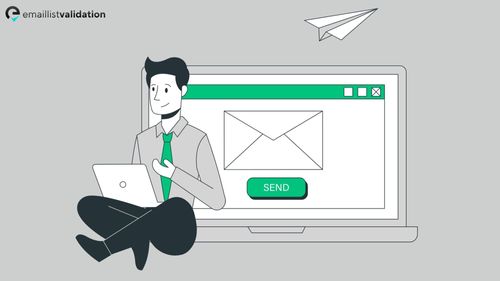In the fast-paced realm of digital communication, email continues to be the backbone of professional and personal correspondence. It's the conduit for businesses to reach out to customers, for individuals to stay connected, and for organizations to engage with their audience. However, beneath the simplicity of an email address lies a critical need for validation. In this comprehensive guide, we'll explore the pivotal role of email validation. From its importance in ensuring the integrity of your data to its indispensable role in enhancing deliverability, we'll equip you with the expertise to harness the full potential of email validation for your success.
Why Email Validation Matters: The Foundation of Trust
Before we dive into the depths of email validation, it's crucial to understand why it holds such a pivotal role in the world of communication.
1. Data Integrity: Email validation is the first line of defense against incorrect, invalid, or fraudulent email addresses. By verifying the authenticity of email addresses, it ensures that your data remains accurate and reliable.
2. Enhanced Deliverability: Sending emails to invalid or non-existent addresses can harm your sender reputation and result in your emails ending up in spam folders or not being delivered at all. Email validation guarantees that your messages reach their intended recipients.
3. Cost Efficiency: Eliminating invalid email addresses from your list reduces wasted resources, saving you both time and money. You pay only for sending emails that have a real chance of being read and acted upon.
4. Improved User Experience: Accurate email addresses lead to better user experiences. Users receive the information they expect, and you avoid frustrating them with bounced emails or incorrect communications.
5. Regulatory Compliance: Many data protection regulations, such as GDPR, require accurate data collection and storage. Email validation plays a crucial role in compliance with these regulations.
Given these compelling reasons, email validation is not just an option; it's a fundamental necessity for businesses and individuals alike.
The Benefits of Email Validation
Email validation offers a plethora of benefits that extend far beyond data accuracy. Here are some of the key advantages:
1. Enhanced Deliverability: By removing invalid addresses from your list, you increase the chances of your emails landing in the inbox, improving open and click-through rates.
2. Reduced Bounce Rates: High bounce rates can negatively impact your sender reputation. Email validation minimizes bounces, ensuring that your reputation remains intact.
3. Cost Savings: Eliminating invalid addresses saves you money on email marketing campaigns, as you only pay for emails that have a chance of conversion.
4. Improved Analytics: Accurate data leads to more reliable analytics, allowing you to make informed decisions based on real engagement metrics.
5. Regulatory Compliance: Email validation ensures that you collect and store user data in compliance with data protection regulations.
Email Validation Use Cases
The applications of email validation span across various industries and scenarios. Here are some key use cases:
1. Marketing Campaigns: Valid email addresses are crucial for successful email marketing campaigns. Email validation ensures that your messages reach your target audience.
2. Account Registration: Email validation is often used during account registration processes to verify the authenticity of user-provided email addresses.
3. Lead Generation: Businesses rely on email validation to collect accurate contact information for potential leads and customers.
4. Data Cleansing: Periodic email validation helps organizations maintain clean and accurate databases, enhancing the effectiveness of their communications.
5. Fraud Prevention: Email validation is a vital tool for preventing fraud, as it identifies potentially suspicious or invalid email addresses.
Best Practices for Email Validation
To maximize the benefits of email validation, consider these best practices:
1. Real-Time Validation: Implement real-time validation during data entry to prevent incorrect email addresses from being collected in the first place.
2. Regular List Cleaning: Periodically clean your email lists to remove invalid addresses that may have accumulated over time.
3. Use Third-Party Tools: Consider using reputable email validation services or APIs for comprehensive validation that goes beyond basic syntax checks.
4. Inform Users: Clearly communicate the need for valid email addresses to users during registration or data entry.
5. Keep Data Secure: Ensure that user data, including email addresses, is stored securely and in compliance with relevant data protection regulations.
Commonly Asked Questions
Q1: Can email validation prevent all types of email-related issues, such as spam or phishing?
Email validation primarily focuses on ensuring the format and existence of an email address. While it helps mitigate some issues, additional measures, such as spam filters and anti-phishing techniques, are necessary to address other email-related threats.
Q2: Is there a difference between email validation and email verification?
The terms are often used interchangeably, but some may make a distinction. Email validation typically refers to the process of checking the format and existence of an email address, while email verification can include additional steps like checking the inbox's deliverability.
Q3: How often should I clean my email list?
The frequency of list cleaning depends on your email collection and usage patterns. Regular cleaning, such as every three to six months, is a good practice to maintain data accuracy.
Q4: Are there open-source email validation tools available?
Yes, there are open-source email validation libraries and tools that you can integrate into your applications, such as validate.js and EmailVerifier.
In conclusion, email validation is the unsung hero of digital communication, playing a crucial role in ensuring data integrity, deliverability, and cost efficiency. By understanding its importance, benefits, and best practices, you can leverage the power of email validation to enhance your communications, build trust with your audience, and achieve greater success in your endeavors, whether you're a business or an individual.



